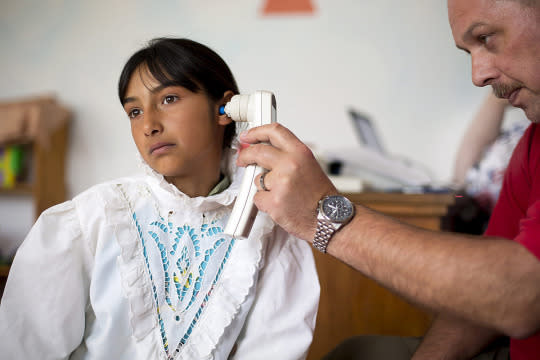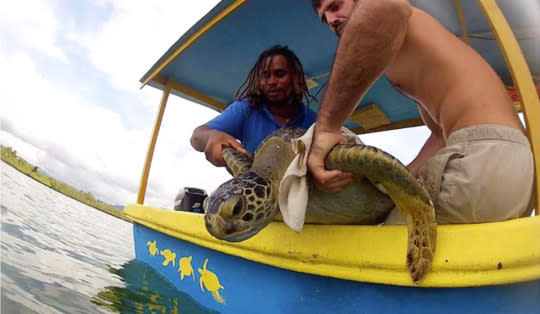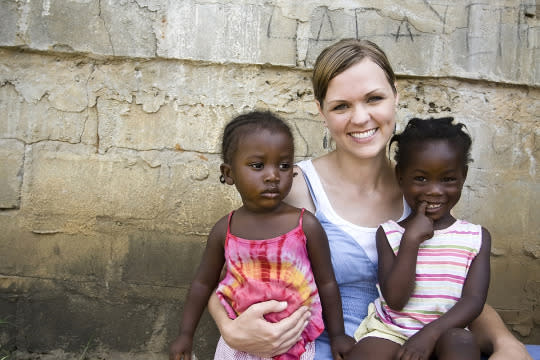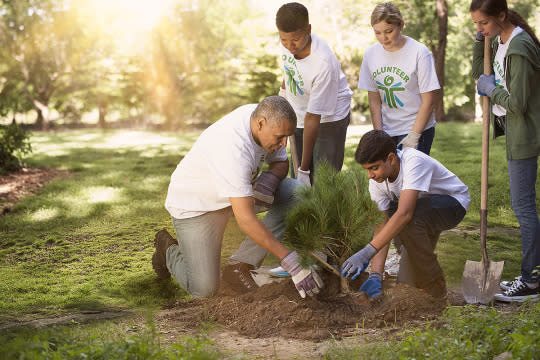Voluntourism — Scam, or Does It Really Do Good?

Traveling the world and helping out may seem like the perfect win-win, but how much good are you really doing? (Photo: Getty Images)
You’ve seen the posts in Instagram and Facebook feeds and blog entries everywhere: “Look at me helping the orphans in (choose the exotic location). So cute! So rewarding!” The question is rewarding for whom? The trend of voluntourism — going on a vacation that includes an element of volunteering, whether to build a water well or teach kids English — has turned into a multi-billion dollar global industry, with dozens of companies selling trips to jet-setters for the ostensible purpose of helping impoverished locals in some far-away spot.
Related: 8 Ways Hotels Can Really Save the Planet

If you don’t have medical or other specialized skill, your “contributions” might actually be more hurtful than helpful to the local community. (Photo: Balazs Mohai/epa/Corbis)
But does Voluntourism actually do any good? One director of a relief group in Nepal gave me some blunt advice to share with aspiring voluntourists: “Unless you’re a doctor, an electrician, or have some specialized skill we can’t find here, please just stay home. Not only are you not helping, you’re a drain on local resources.”
Particularly in disaster-struck areas or remote locations, volunteers must be housed, fed, and provided with bottled water and other essentials, which, even if fully paid for by the volunteers are still a strain on the local supply chain. Untrained volunteers, even with the best intentions, can’t do much more than hammer a few crooked nails, dig ditches, perform basic labor tasks that could easily be done by locals — actually exacerbating local unemployment problems and denying a job opportunity and training for the people you’re supposed to be helping. A recent academic study found “voluntourism to be a poor substitute for traditional development work.”

See Turtles highly values the role that volunteers play in their sea turtle conservation projects in places like Costa Rica. (Photo: SEE Turtles/Facebook)
But there can be a case made for voluntourism in certain contexts. Brad Nahill, director of SeeTurtles.org, says that volunteers on his trips to Costa Rica and other destinations have provided value in performing basic tasks like counting and measuring turtles and providing a presence on beaches. He told Yahoo that “without voluntourism, there would be dozens of sea turtle conservation projects that would cease to exist, leaving important nesting beaches completely unprotected.” Kerry Rodgers, Director of GiveADayGlobal, said her one-day volunteer sessions in foreign countries are as much about “raising awareness” and providing future inspiration for the volunteers as they are to provide a service.
Related: 5 Ways Your Vacation Is Killing Sea Turtles

While the idea of helping kids at an orphanage might be heartwarming, the reality can be quite the opposite. (Photo: iStock)
With all the money involved in the Voluntourism industry, some savvy (and unsavory) local operators have been quick to exploit the trend for their own profit. Cambodia, in particular, has become notorious for the creation of bogus orphanages meant to take advantage of the casual do-gooder’s wallet. UNICEF issued a report which said 75 percent of kids in Cambodian “orphanages” were not in fact orphans, but placed there by their parents. And even the legitimate orphanages, in the words of the NGO advisor in Nepal, “don’t need some rich German to come by and play football with the kids for two hours and go home. Doesn’t do a bit of good. The children feel abandoned again when their new ‘friend’ leaves.”
The tough reality is that doing good, really making a difference, is long, hard work, requiring time, effort, skills, training, and most of all, commitment — the complete opposite of the of here-one-day, gone-the-next status of tourists.
So what’s a well-meaning person to do when confronted by images of trouble around the world?

A monetary donation can go much farther towards a long term solution than your short term stay. (Photo: iStock)
Donate cash to a well-run local charity: Your money will help enable experts already on the ground there to stay longer and make more of a difference. Instead of spending a thousand dollars on airfare to some exotic spot, use that same money to donate to groups to hire and train locals to do whatever basic task you had imagined yourself doing. It’ll have the dual effect of helping a local in the short term, and the community in the long term, as they’ll develop skills to help themselves. If the organization doesn’t employ any locals, then you’re probably looking at the wrong group. Charitynavigator.org is a good place to search for well-run aid groups in your area of interest.

Mountain Lodges of Peru offers a great way to support local communities while traveling and staying in stunning lodges. (Photo: Mountain Lodges of Peru/Facebook)
Patronize local businesses while on vacation: Nothing against the big name corporation Hiltons and Hyatts of the world, but if you’re staying in some fancy hotel in an exotic destination with a multinational staff, chances are only a tiny percentage of your cash is going locals. Stay at a family-run bed and breakfast, a locally owned and operated hotel, or a community-run property (one good example is Mountain Lodges of Peru’s Huacahuasi joint venture) and your cash will probably help local development more than a day of volunteer unskilled labor. Brad Nahill said for his trips that “the money spent by tourists in local communities is as important (if not more important) than the money that goes to the conservation project.”

Share your skills in areas such as carpentry, medicine, business, and web design with locals and make a lasting difference in their community. (Photo: iStock)
If you have specialized skills, find a good outlet: In some cases, you actually can fill a critical temporary need in a disaster struck area or provide locals training in your field of expertise (think doctor, nurse, carpenter, accountant). This is not to say only the elite-trained can help others, but to justify the round-the-world jaunt, you should probably have something specific to deliver aside from sympathy. One organization that helps match skilled professionals with volunteer opportunities is MovingWorlds.org and its “experteering” campaign.
Related: Volunteer Pilots Help Doomed Dogs Get a Second Chance at Life

From working at a soup kitchen to helping clean up a local park, there are plenty of opportunities for you to do good without leaving the country. (Photo: Getty Images)
Help at home: You don’t need to travel to Benin to do good. Volunteer at a local school, hospital, or religious organization near where you live and see what a difference you can make within your own community over time. You’ll discover both the difficulty of helping enact sustainable change, and the reward of being around to witness and benefit from the change when it happens.
WATCH: Spend the Best Day of Your Life at This Elephant Retirement Home
Let Yahoo Travel inspire you every day. Hang out with us on Facebook, Twitter, Instagram, and Pinterest.
